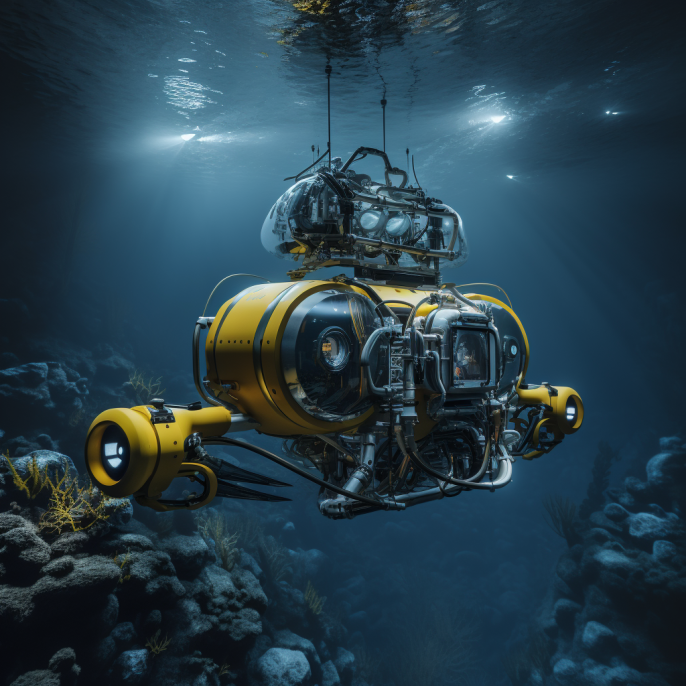The ocean has long captured the human imagination, a vast and mysterious expanse that covers more than 70% of our planet's surface. Its depths hold secrets that have eluded scientists for centuries, from the hidden ecosystems of the deep sea to the uncharted landscapes of the ocean floor. As we stand on the cusp of a new era of exploration, robotics is the key that is unlocking these mysteries.
The advancements in robotics technology are revolutionizing the field of underwater exploration, enabling us to venture into the ocean's depths where no human can go. Robots, equipped with advanced sensors and cameras, are sending back stunning images and data from the abyss, revealing marine life and underwater landscapes that have never been seen before. As we explore the uncharted depths of our oceans, we are uncovering unprecedented discoveries that are rewriting our understanding of the marine world.
But the impact of robotics on underwater exploration goes beyond the scientific discoveries. Robots are also playing a vital role in mapping the ocean floor, providing valuable data for industries such as oil and gas exploration, underwater mining, and maritime security. The ability of robots to operate in harsh environments and withstand extreme pressures is enabling us to explore and exploit the ocean's resources in ways that were previously unimaginable.

As we continue to push the boundaries of what is possible, we must also consider the ethical implications of our actions. The oceans are a fragile ecosystem that is already under threat from human activities such as overfishing, pollution, and climate change. As we unlock the mysteries of the marine world, we must ensure that we do so in a way that respects and protects the oceans and the life they support.
In this article, we will explore the revolutionary role of robotics in underwater exploration, the unprecedented discoveries being made, and the ethical considerations that must be addressed as we continue to unravel the depths of our planet's oceans.
Beyond Scientific Discoveries
The fusion of robotics and underwater exploration extends far beyond the academic pursuit of marine science. These robotic explorers are transforming a range of industries, reshaping economies, and redefining the limits of human capability. The data collected by robots is becoming an invaluable resource for industries such as offshore drilling, marine archaeology, and maritime security, fueling a new era of technological and economic growth.
In the realm of offshore drilling, robots equipped with advanced sensors are playing a crucial role in mapping the ocean floor and locating untapped reserves of oil and natural gas. These discoveries are enabling the industry to expand its operations and meet the growing global demand for energy. However, the extraction of these resources presents significant environmental and ethical challenges, prompting a reassessment of the industry's practices and its impact on marine ecosystems.
Marine archaeology is another field that is benefiting from the advancements in robotics technology. Robots are assisting archaeologists in uncovering and documenting submerged historical sites, shipwrecks, and artifacts that provide valuable insights into our past. These discoveries are shedding light on ancient civilizations, trade routes, and maritime history, enhancing our understanding of human culture and heritage.
Maritime security is also leveraging the capabilities of robots to enhance surveillance and monitoring of the world's oceans. These robots are playing a crucial role in combating piracy, smuggling, and illegal fishing, safeguarding international waters and protecting the interests of nations and industries. The deployment of robots in maritime security is raising questions about the balance between security and privacy, and the implications of increased surveillance on individual rights and freedoms.
As we continue to explore and exploit the depths of our oceans using robotics, we must grapple with the broader implications of these advancements. The fusion of robotics and underwater exploration is reshaping industries, economies, and societies, and raising important ethical and philosophical questions about our relationship with the marine world and our responsibility to protect it. In this article, we will delve deeper into these questions and explore the impact of robotics on underwater exploration and the challenges that lie ahead.

Unearthing New Discoveries
The technological advancements brought about by robotics are providing marine scientists with new tools to explore and understand the mysteries of the deep sea. The ability of robots to operate autonomously in harsh environments and collect valuable data is enabling researchers to uncover previously unknown marine species and ecosystems. The exploration of the deep sea using robots is shedding light on the intricate web of life that exists beneath the surface, from the smallest microorganisms to the largest marine mammals.
As robots continue to explore the depths of our oceans, the data they collect is enhancing our understanding of marine biodiversity and the complex interplay of factors that shape life in the ocean. The discoveries made by these robotic explorers are providing valuable insights into the role of the deep sea in the global carbon cycle, the impacts of human activities on marine ecosystems, and the potential for new medical and pharmaceutical applications derived from marine organisms.

The exploration of the deep sea using robots is also unlocking new possibilities for industries such as offshore drilling, underwater mining, and maritime security. The data collected by robots is enabling these industries to operate more efficiently and sustainably, reducing their environmental footprint and mitigating the impacts of their activities on marine ecosystems. The ability of robots to operate autonomously in harsh environments and collect valuable data is opening up new opportunities for economic growth and technological innovation.
As we continue to explore and exploit the depths of our oceans using robotics, we must also consider the ethical implications of these advancements. The oceans are a fragile ecosystem that is already under threat from human activities such as overfishing, pollution, and climate change. The arrival of robotics in the underwater realm brings with it new opportunities, but also new challenges. How do we ensure that our exploration is done in a way that respects and protects the oceans and the life they support?
Environmental Considerations and Ethical Implications
The oceans, covering over 70% of our planet's surface, are home to a diverse and intricate web of life, from the smallest plankton to the largest whales. These ecosystems are interwoven and interdependent, creating a delicate balance that is essential for the survival of marine life. The advancements in robotics technology that are enabling us to explore and exploit the depths of our oceans come with a responsibility to protect and preserve these fragile ecosystems.
As robots venture into the abyss, collecting data and images from the ocean floor, we must consider the potential impacts of our actions on marine life and ecosystems. The noise and vibrations generated by robotic explorers can disturb marine animals, affecting their behavior and communication. The presence of robots in the deep sea can also disrupt the natural processes that occur in these ecosystems, potentially impacting the health and vitality of marine life.
In addition to the direct impacts on marine life, the exploration and exploitation of the oceans using robotics have broader environmental and ethical implications. The extraction of resources from the ocean floor, such as oil, natural gas, and minerals, can result in pollution, habitat destruction, and the release of greenhouse gases. These activities can have far-reaching consequences, affecting not only marine life but also the global climate.
As we continue to explore and exploit the depths of our oceans using robotics, we must grapple with the ethical dilemmas that arise. How do we balance the benefits of technological innovation and economic growth with the need to protect and preserve the oceans and the life they support? How do we ensure that our actions are responsible and sustainable, not only for the present generation but also for future generations?

Robotic Innovations and Underwater Exploration
The robotic revolution in underwater exploration is made possible by an array of technological innovations that are propelling us into uncharted waters. Autonomous underwater vehicles (AUVs) equipped with cutting-edge sensors and cameras have become invaluable tools for scientists and researchers, opening up new vistas of the deep sea and shedding light on marine ecosystems that were previously hidden from view. These robots are capable of diving to depths that are inaccessible to human divers, capturing high-resolution images and data from the ocean floor.
The use of artificial intelligence (AI) and machine learning in underwater robotics is enabling us to process and analyze the vast amount of data collected by these robots, transforming raw data into meaningful insights. AI algorithms can identify and classify marine species, detect changes in underwater landscapes, and monitor the health of marine ecosystems. These capabilities are providing us with a deeper understanding of the marine world and helping us to uncover the secrets of the ocean depths.
The impact of robotics on underwater exploration is not limited to scientific research. The data collected by robotic explorers are also being used by industries such as offshore drilling, underwater mining, and maritime security. The detailed maps of the ocean floor generated by robots are helping to identify potential drilling sites and mineral deposits, enabling us to harness the resources of the ocean in a more efficient and sustainable way.
In the field of marine archaeology, robotic explorers are playing a pivotal role in uncovering the secrets of the past. The ability of robots to operate in harsh environments and navigate through narrow spaces has made it possible to explore shipwrecks and underwater ruins that were previously out of reach. The data and images collected by robots are helping archaeologists to piece together the history of ancient civilizations and gain new insights into the maritime heritage of humanity.
As we continue to explore the depths of our oceans using robotics, the potential for new discoveries and advancements is limitless. The pioneering role of robotics in underwater exploration is paving the way for a deeper understanding of our planet's oceans, unlocking the mysteries of the marine world, and opening up new frontiers in science and industry.

Exploring New Horizons: The Ethical and Environmental Considerations
As the underwater robotic exploration ushers us into a new era of discovery, it is essential that we pause and consider the ethical and environmental implications of our actions. The oceans are an integral part of our planet's ecosystem, and their health is closely linked to the well-being of all life on Earth. As we venture deeper into the marine world, we must ensure that our actions do not adversely affect the delicate balance of the oceanic ecosystem.
The application of robotics in underwater exploration has the potential to transform our understanding of marine life, but it also poses ethical dilemmas that need to be addressed. The data collected by robotic explorers could be used to exploit the resources of the ocean for commercial gain, without regard for the impact on marine ecosystems. It is essential that the information gathered by robots is used responsibly and for the benefit of all.
The deployment of robots in the oceans also raises questions about the impact on marine life. The noise and light generated by robots can disturb marine species and alter their natural behavior. As we continue to explore the depths of the oceans, it is crucial that we develop technologies that minimize the impact on marine life and the environment.
In addition to the ethical considerations, there are also environmental challenges that need to be addressed as we explore the depths of the oceans. The oceans are already facing threats from human activities such as pollution, overfishing, and climate change. As we unlock the mysteries of the marine world, we must ensure that our actions do not exacerbate these problems.
The oceans are a shared resource, and their health and well-being are the responsibility of all. As we continue to explore the depths of the oceans using robotics, we must do so with a sense of responsibility and a commitment to the ethical and environmental principles that guide our actions. It is only by respecting and protecting the oceans that we can unlock their mysteries and ensure their continued health for generations to come.
Pioneering Discoveries: The Uncharted Depths of the Oceans
The dawn of underwater robotic exploration has opened up a world of new possibilities. With each dive, robots are revealing the wonders of the deep sea, from the vibrant coral reefs to the elusive marine species. The images and data sent back from the depths are giving us a glimpse into a world that has been hidden from our eyes for centuries.
As robots venture deeper into the oceans, they are uncovering new ecosystems and marine species that were previously unknown. The discovery of hydrothermal vents and the unique ecosystems that thrive in these extreme environments is rewriting our understanding of marine biology. The ability of life to exist in the harshest of conditions is challenging our preconceptions and expanding our horizons.
But the impact of robotics on underwater exploration is not limited to the scientific discoveries. The data collected by robots is also providing valuable insights into the geological and geophysical processes that shape our planet. The mapping of the ocean floor is revealing the intricate patterns of tectonic plate movements and the volcanic activity that has shaped the earth's crust.
As we continue to explore the depths of the oceans, we are also uncovering the historical and cultural treasures that have been hidden beneath the waves. The discovery of shipwrecks and ancient artifacts is shedding light on the maritime history and the cultural exchanges that have shaped our world. The ability of robots to explore the depths is unlocking the secrets of our past and giving us a deeper understanding of our shared heritage.
The pioneering spirit of underwater robotic exploration is taking us on a journey of discovery that is transforming our understanding of the marine world. As we continue to unravel the depths of the oceans, we are opening up new horizons of knowledge and expanding the frontiers of human exploration. The oceans hold the keys to the mysteries of our planet, and robotics is the tool that is unlocking these secrets.
Remember, behind every great robot, there's an even greater Aquaman human!






